[ad_1]
US does not expect significant Russian gains in the next year, says Pentagon official
A senior Pentagon official has said the US did not expect Russia to make significant territorial gains in Ukraine in the near term and described the frontlines of the war as a “grinding slog”.
Colin Kahl, the US undersecretary of defence for policy, told a House of Representatives hearing today:
You may see small portions of territory change hands in the coming weeks and months. I do not think that there’s anything I see that suggests the Russians can sweep across Ukraine and make significant territorial gains anytime in the next year or so.
Kahl was asked repeatedly by US lawmakers about sending the jets to Ukraine, Reuters reports. He replied:
It is a priority for the Ukrainians, but it is not one of their top three priorities.
Key events
This blog is now closed. You can catch up on the latest Ukraine war coverage here.
Closing summary
It’s 9pm in Kyiv. Here’s where we stand:
-
A senior Pentagon official has said the US did not expect Russia to make significant territorial gains in Ukraine in the near term and described the frontlines of the war as a “grinding slog”. Colin Kahl, the US undersecretary of defence for policy, told a House of Representatives hearing: “I do not think that there’s anything I see that suggests the Russians can sweep across Ukraine and make significant territorial gains anytime in the next year or so.”
-
A military drone attempted to strike a gas facility in the Moscow region, according to a senior Russian official, and photos of the wreckage suggested it was Ukrainian-made, indicating a rare attempted strike hundreds of miles behind Russian lines. The alleged attack was one of several reports of successful or attempted unmanned aerial vehicle (UAV) strikes in at least four regions of Russia.
-
Russia’s Pulkovo airport in St Petersburg temporarily suspended all flights earlier today amid unconfirmed media reports of an unidentified object such as a drone being seen nearby. Some flights were diverted back to Moscow while the airport was shut for about an hour. Russia’s defence ministry later announced there had been a training exercise between air defences and civilian aviation authorities.
-
Emergency services put out a fire at an oil depot in southern Russia overnight after a drone was spotted flying overhead, the RIA news agency said. The fire in the Russian town of Tuapse, Krasnador, was reported at 2.30am local time and spread to an area of about 200 sq metres before it was extinguished. “The oil tanks were not affected. There was no spill of oil products. No injuries,” said Sergei Boyko, who leads the local administration.
-
The Russian defence ministry has stated that it foiled two attempted Ukrainian attacks on Russian soil using drones overnight. It said: “28 February, at night, the Kyiv regime attempted to use unmanned aerial vehicles (UAVs) to attack civilian infrastructure in the Krasnodar territory and the Republic of Adygea.” The claims have not been independently verified.
-
The military situation is becoming increasingly difficult around the eastern Ukrainian town of Bakhmut, Volodymyr Zelenskiy said on Monday, as many of Ukraine’s battlefields turn to mud. The Ukrainian president said in his nightly address: “The enemy is constantly destroying everything that can be used to protect our positions for fortification and defence.” Russia’s defence ministry claimed its forces destroyed a Ukrainian ammunition depot near the town – the focal point of Russia’s advances in eastern Ukraine – also shooting down four Himars missiles and five drones launched by Ukrainian forces.
-
Vladimir Putin has told Russia’s FSB security service to step up its intelligence activity and stop “sabotage groups” entering the country. In a speech to FSB officials, the Russian leader instructed the agency to strengthen its activity to counter what he described as growing espionage and sabotage operations against Russia by Ukraine and its western allies. He also admitted that FSB members had been killed in Ukraine.
-
Russia is open to negotiations to end the conflict in Ukraine, the Kremlin’s spokesperson, Dmitry Peskov, has said, but he insisted Moscow would “never compromise” on what he described as new “territorial realities”. Speaking to reporters during a regular briefing, Peskov said Moscow would not renounce its claims to four Ukrainian regions that Putin annexed in September.
-
The US secretary of state, Antony Blinken, has reiterated the Biden administration’s concern that China is considering providing lethal aid to Russia for its war in Ukraine. Speaking after a meeting with leaders in the Kazakh capital, Astana, Blinken warned that Beijing would face “implications and consequences” if it decided to provide such support.
-
China has “very clearly” taken Russia’s side and has been “anything but an honest broker” in efforts to bring peace to Ukraine, the US department of state spokesperson Ned Price said at a news briefing yesterday. China has provided Russia with “diplomatic support, political support, with economic support, with rhetorical support”, he added.
-
A hacking attack caused some Russian regional broadcasters to put out a false warning urging people to take shelter from an incoming missile attack, the emergencies ministry said. “As a result of the hacking of servers of radio stations and TV channels, in some regions of the country information about the announcement of an air alert was broadcast. This information is false and does not correspond to reality.” A similar attack caused commercial radio stations in some Russian regions to send air alarm messages on Wednesday last week.
-
Ukraine will become a Nato member in the “long term”, the alliance’s secretary general, Jens Stoltenberg, has said. The Nato chief stressed that the immediate priority was Ukraine remaining an independent country in the face of the Russian invasion. He said Finland and Sweden’s bids to join the alliance were a “top priority” and that the Nordic countries have had the “quickest accession process in Nato’s modern history”.
-
Alexander Lukashenko, the president of Belarus and a close ally of the Putin, has arrived in Beijing for a meeting with his Chinese counterpart, Xi Jinping.
Putin signs law formally suspending New Start nuclear arms treaty participation
Vladimir Putin has formally signed a law suspending Russia’s participation in New Start, the last major remaining nuclear arms control treaty with the US, state media reported.
The text of the law’s explanatory note read:
The Russian Federation suspends the treaty between the Russian Federation and the United States of America on measures for the further reduction and limitation of strategic offensive arms, signed in Prague on April 8 2010.
Russian state-run Tass news agency reported that the document was published today, and the law came into force as of the moment of its official publication.
Putin announced the suspension of Russia’s participation in the New Strategic Arms Reduction Treaty, known as New Start, earlier this month.
“They want to inflict a strategic defeat on us and claim our nuclear facilities,” said Putin in a speech before the one-year anniversary of Russia’s invasion of Ukraine.
In this regard, I am forced to state that Russia is suspending its participation in the strategic offensive arms treaty.
Finland has begun construction of a 200km fence on the Russian border, the country’s border guard has announced.
Terrain work would begin today “with forest clearance and will proceed in such a way that road construction and fence installation can be started in March”, the Finnish border guard said in a statement.
The 3km pilot project at the border crossing near Imatra is expected to be completed by the end of June, it added. Construction of a further 70km, mainly in southeastern Finland, will take place between 2023 and 2025.
The fence will be more than 3 metres tall with barbed wire at the top, and particularly sensitive areas will be equipped with night vision cameras, lights and loudspeakers.
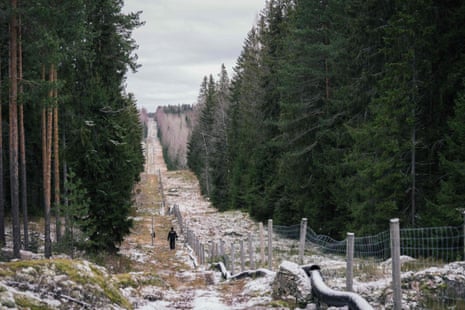
Currently, Finland’s borders are secured primarily by light wooden fences, mainly designed to stop livestock.
Although the Finland-Russia border has “worked well” in the past, Brig Gen Jari Tolppanen told AFP in November that the war in Ukraine had changed the security situation “fundamentally” and that a border fence was “indispensable” to stop large-scale illegal entries from Russian territory.
The head of the UN’s nuclear agency, Rafael Grossi, has expressed “concern” about Ukraine’s Russian-controlled Zaporizhzhia nuclear power plant, citing the facility’s “fragile” power situation, delays in staff rotations, an increased security presence onsite and nearby fighting.
In a statement, the International Atomic Energy chief said:
The sound of artillery fire near Ukraine’s Zaporizhzhya Nuclear Power Plant (ZNPP) and the temporary loss of its only remaining back-up power line have again underlined persistent nuclear safety and security risks during the military conflict in the country.
IAEA experts who have been at the plant since early January reported hearing about 20 “detonations” yesterday afternoon, “apparently in the vicinity of the plant, which is located on the frontline of an active combat area”.
Grossi added:
This is a concerning trend that shows the urgency and importance of establishing a nuclear safety and security protection zone at the Zaporizhzhya Nuclear Power Plant.
The Zaporizhzhia nuclear plant, Europe’s largest, was captured by Russian forces in March 2022, soon after their invasion of Ukraine.
The Chinese satellite firm Spacety provided satellite images to the Russian mercenary Wagner group, the US assistant secretary of state for East Asian and Pacific Affairs, Daniel Kritenbrink, told a congressional hearing today.
Spacety was added to a US trade blacklist earlier this month for allegedly supporting the Russian military, along with another Chinese satellite company, China HEAD Aerospace Technology Co.
Spacety, which was also put under sanctions by the US treasury department in January, at the time said it had complied with international sanctions against Russia.
US does not expect significant Russian gains in the next year, says Pentagon official
A senior Pentagon official has said the US did not expect Russia to make significant territorial gains in Ukraine in the near term and described the frontlines of the war as a “grinding slog”.
Colin Kahl, the US undersecretary of defence for policy, told a House of Representatives hearing today:
You may see small portions of territory change hands in the coming weeks and months. I do not think that there’s anything I see that suggests the Russians can sweep across Ukraine and make significant territorial gains anytime in the next year or so.
Kahl was asked repeatedly by US lawmakers about sending the jets to Ukraine, Reuters reports. He replied:
It is a priority for the Ukrainians, but it is not one of their top three priorities.
Belarus president Lukashenko arrives in China
Alexander Lukashenko, the president of Belarus and a close ally of the Russian leader Vladimir Putin, has arrived in Beijing for a meeting with his Chinese counterpart, Xi Jinping.

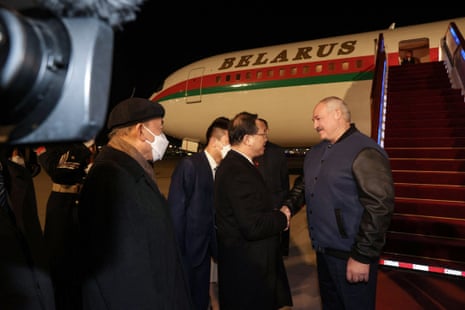
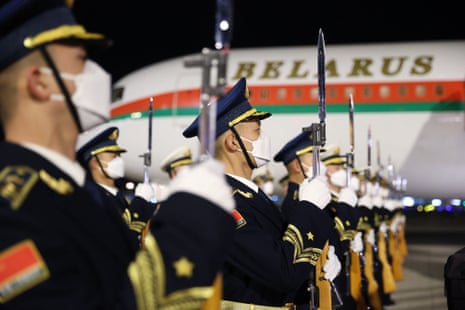
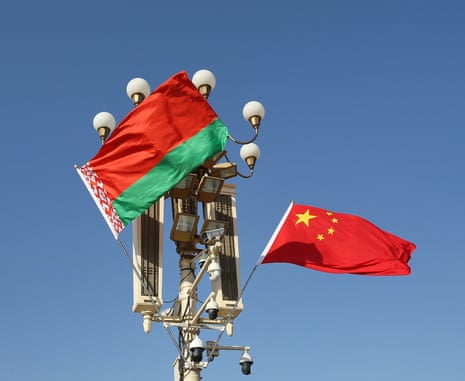
Russia says military drone attempted to strike gas facility near Moscow

Andrew Roth
A military drone attempted to strike a gas facility in the Moscow region, according to a senior Russian official, and photos of the wreckage suggested it was Ukrainian-made, indicating a rare attempt to strike hundreds of miles behind Russian lines.
The alleged attack was one of several reports of successful or attempted unmanned aerial vehicle (UAV) strikes in at least four regions of Russia.
The Moscow region governor, Andrei Vorobyov, on Monday confirmed a UAV crash-landed in the village of Gubastovo near the capital and was apparently aiming for a “civilian infrastructure site”.

The target was said to be a Gazprom gas compression station in the Moscow suburbs, just over 50 miles south-east of the Kremlin. Photographs of the drone posted to social media indicate it was a Ukrainian-made UJ-22.
Ukraine does not publicly claim responsibility for attacks inside Russia.
The UAV apparently clipped trees just before its target and landed 10 metres from the outer fence of the gas compression station, a Gazprom representative confirmed to Russian media.
Ukrjet, the producer of the UJ-22, claims the drone can fly 500 miles (800km) and is armed with an interchangeable payload.
The strike was among others launched on Tuesday. If they were launched from Ukrainian territory, then it would make them some of the most ambitious since the Kremlin launched its full-scale invasion last February.
Summary of the day so far
It’s 6pm in Kyiv. Here’s where we stand:
-
The US secretary of state, Antony Blinken, has reiterated the Biden administration’s concern that China is considering providing lethal aid to Russia for its war in Ukraine. Speaking after a meeting with leaders in the Kazakh capital, Astana, Blinken warned that Beijing would face “implications and consequences” if it decided to provide such support.
-
China has “very clearly” taken Russia’s side and has been “anything but an honest broker” in efforts to bring peace to Ukraine, US department of state spokesperson Ned Price said at a news briefing yesterday. China has provided Russia with “diplomatic support, political support, with economic support, with rhetorical support”, he added.
-
Vladimir Putin has told Russia’s FSB security service to step up its intelligence activity and stop “sabotage groups” entering the country. In a speech to FSB officials, the Russian leader instructed the agency to strengthen its activity to counter what he described as growing espionage and sabotage operations against Russia by Ukraine and its western allies. He also admitted that FSB members had been killed in Ukraine.
-
Russia’s Pulkovo airport in St Petersburg temporarily suspended all flights earlier today amid unconfirmed media reports of an unidentified object such as a drone being seen nearby. Some flights were diverted back to Moscow while the airport was shut for about an hour. Russia’s defence ministry later announced there had been a training exercise between air defences and civilian aviation authorities.
-
Emergency services put out a fire at an oil depot in southern Russia overnight after a drone was spotted flying overhead, the RIA news agency said. The fire in the Russian town of Tuapse, Krasnador, was reported at 2.30am local time and spread to an area of about 200 sq metres before it was extinguished. “The oil tanks were not affected. There was no spill of oil products. No injuries,” said Sergei Boyko, who leads the local administration.
-
The Russian defence ministry has stated that it foiled two attempted Ukrainian attacks on Russian soil using drones overnight. It said: “28 February, at night, the Kyiv regime attempted to use unmanned aerial vehicles (UAVs) to attack civilian infrastructure in the Krasnodar territory and the Republic of Adygea.” The claims have not been independently verified.
-
A drone that was downed in the Moscow region had probably been intended to attack civil infrastructure, according to the region’s governor. The drone was downed earlier today near a gas distribution station close to the city of Kolomna, 70 miles (110km) south-east of Moscow, the Russian state-run Ria Novosti news agency reported, citing local emergency services.
-
The military situation is becoming increasingly difficult around the eastern Ukrainian town of Bakhmut, Volodymyr Zelenskiy said on Monday as many of Ukraine’s battlefields turn to mud. The Ukrainian president said in his nightly address: “The enemy is constantly destroying everything that can be used to protect our positions for fortification and defence.” Russia’s defence ministry claimed its forces destroyed a Ukrainian ammunition depot near the town – the focal point of Russia’s advances in eastern Ukraine – also shooting down four Himars missiles and five drones launched by Ukrainian forces.
-
Russia is open to negotiations to end the conflict in Ukraine, the Kremlin’s spokesperson, Dmitry Peskov, has said, but he insisted Moscow would “never compromise” on what he described as new “territorial realities”. Speaking to reporters during a regular briefing, Peskov said Moscow would not renounce its claims to four Ukrainian regions that Vladimir Putin annexed in September.
-
A hacking attack caused some Russian regional broadcasters to put out a false warning urging people to take shelter from an incoming missile attack, the emergencies ministry said. “As a result of the hacking of servers of radio stations and TV channels, in some regions of the country information about the announcement of an air alert was broadcast. This information is false and does not correspond to reality.” A similar attack caused commercial radio stations in some Russian regions to send air alarm messages on Wednesday last week.
-
Ukraine will become a Nato member in the “long term”, the alliance’s secretary general, Jens Stoltenberg, has said. The Nato chief stressed that the immediate priority was Ukraine remaining an independent country in the face of the Russian invasion. He said Finland and Sweden’s bids to join the alliance were a “top priority” and that the Nordic countries have had the “quickest accession process in Nato’s modern history”.
-
The loss of an A-50 Mainstay plane would be significant as it is critical to Russian air operations in “providing an air battlespace picture”, the UK Ministry of Defence has said in response to earlier claims from Belarusian anti-war partisans to have severely damaged a Russian military aircraft on Sunday. BYPOL, the Belarusian partisan organisation, said it had used drones to strike the Machulishchy airfield, 12km from Minsk, severely damaging a Beriev A-50 airborne early-warning and control aircraft (Awacs).
-
Poland will cut its oil imports from Russia to “close to zero” in February and March, the country’s prime minister, Mateusz Morawiecki, has said. His remarks came after Poland’s largest oil company, PKN Orlen, said Russia had unexpectedly halted supplies of oil to Poland via the northern leg of the Druzhba pipeline.
Good afternoon from London. I’m Léonie Chao-Fong and I’m here to bring you all the latest developments from the war in Ukraine. I’m on Twitter or you can email me.
The US secretary of state, Antony Blinken, has reiterated the Biden administration’s concern that China is considering providing lethal aid to Russia for its war in Ukraine.
Speaking after a meeting with leaders in the Kazakh capital, Astana, Blinken warned that Beijing would face “implications and consequences” if it decided to provide such support. He said:
We will not hesitate, for example, to target Chinese companies or individuals that violate our sanctions, or otherwise engage in supporting the Russian war effort.
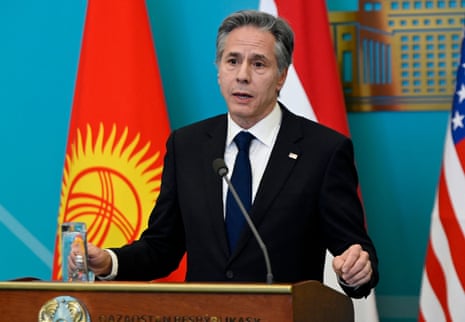
He said he had raised the issue directly with the top Chinese diplomat, Wang Yi, last week “because of concern we have based on information that we have, that China is considering moving beyond the non-lethal support that some of its companies have been providing to actually lethal material support for Russia’s war effort in Ukraine”.
He added:
China can’t have it both ways when it comes to the Russian aggression in Ukraine. It can’t be putting forward peace proposals on the one hand, while actually feeding the flames of the fire that Russia has started with the other hand.
[ad_2]
READ SOURCE






